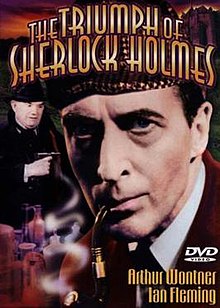The Triumph of Sherlock Holmes is a 1935 British mystery film directed by Leslie S. Hiscott and starring Arthur Wontner. It was based on the 1915 Sherlock Holmes novel The Valley of Fear by Arthur Conan Doyle.[1]
| The Triumph of Sherlock Holmes | |
|---|---|
 | |
| Directed by | Leslie S. Hiscott |
| Written by | H. Fowler Mear Cyril Twyford |
| Based on | Valley of Fear by Arthur Conan Doyle |
| Produced by | Julius Hagen (producer) |
| Cinematography | William Luff |
| Edited by | Jack Harris Ralph Kemplen |
| Music by | W.L. Trytel |
Release date | 1935 |
Running time | 84 minutes |
| Country | United Kingdom |
| Language | English |
It is the fourth film in the 1931–1937 film series starring Wontner as Sherlock Holmes.[2]
Plot
Sherlock Holmes and Dr. Watson come out of retirement to investigate a mysterious murder. They find that an American criminal organisation called The Scowrers has asked evil mastermind Professor Moriarty to wreak vengeance on John Douglas, the informant who sent them to prison. Holmes outsmarts Moriarty, solves the murder and brings Moriarty to justice.
Like all the films featuring Wontner as Holmes, this one has a contemporary (e.g. 1930's) setting, making the flashback sequence pitting undercover detective Douglas against the Scowrers somewhat problematical since, historically, the real-life incident on which this sequence is based, Pinkerton operative James McParland's infiltration of the Molly Maguires, occurred in the 1870s, a full half-century earlier.
Cast
- Arthur Wontner as Sherlock Holmes
- Lyn Harding as Professor Moriarty
- Leslie Perrins as John Douglas
- Jane Carr as Ettie Douglas
- Ian Fleming as Dr. Watson
- Charles Mortimer as Inspector Lestrade
- Minnie Rayner as Mrs. Hudson
- Michael Shepley as Cecil Barker
- Ben Welden as Ted Balding
- Roy Emerton as Boss McGinty
- Conway Dixon as Ames
- Wilfrid Caithness as Col. Sebastian Moran
- Edmund D'Alby as Capt. Marvin
- Ernest Lynds as Jacob Shafter
Critical reception
The New York Times wrote, "a mellow, evenly paced British film that renders to Holmes what Sir Arthur Conan Doyle would have rendered to him: Interest, respect and affection...Mr. Wontner decorates a calabash pipe with commendable skill, contributing a splendid portrait of fiction's first detective. Lyn Harding is capital as Moriarty and Roy Emerton, Leslie Perrins, Ian Fleming and Michael Shepley perform competently."[3]
References
- ^ "The Triumph of Sherlock Holmes". BFI. Archived from the original on 25 July 2012.
- ^ Barnes, Alan (2011). Sherlock Holmes on Screen. Titan Books. pp. 292–293. ISBN 9780857687760.
- ^ "Movie Review - The Triumph of Sherlock Holmes - At the Criterion. - NYTimes.com".
External links